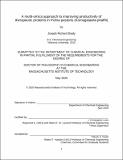A multi-omics approach to improving productivity of therapeutic proteins in Pichia pastoris (Komagataella phaffii)
Author(s)
Brady, Joseph Richard.
Download1193319993-MIT.pdf (4.583Mb)
Other Contributors
Massachusetts Institute of Technology. Department of Chemical Engineering.
Advisor
J. Christopher Love.
Terms of use
Metadata
Show full item recordAbstract
Market sizes for novel therapies and growing demand for existing treatments in emerging markets promise to challenge the current capacity for production of therapeutic proteins. Significant reductions in cost and development speed are required to serve patients in the developing world, promote rapid response to disease outbreaks, and pave the way for increasingly personalized medicines. Production of therapeutic proteins in CHO is unlikely to meet future requirements for capacity, cost, and speed. Alternative hosts must be developed to supplement and sustain biomanufacturing. The yeast Komagataella phaffii is the only alternative host that blends three critical features: fast growth to high cell density on inexpensive media, secretion of complex human proteins at reasonable titers with minimal host modifications, and regulatory precedent for the production of several marketed biologics. A new approach is needed, however, to convert these opportunities for K. phaffii into a meaningful impact on global biomanufacturing. Decades of research in this host have not yet translated into widespread use for complex but important proteins such as monoclonal antibodies (mAbs). In this thesis, we define a new approach, strain engineering, which leverages a multi-omics approach and modern genetic tools to rapidly and rationally understand cell biology and engineer solutions. We apply this strain engineering approach through three levers: smarter molecular design, selection of an optimal starting strain, and modifying the host genome for a product class. In the first part of this thesis, we engineered the sequences of a trivalent rotavirus vaccine to mitigate glycosylation, aggregation, and truncation variants and improve product titers. Using in silico sequence analysis, RNA-Seq, and ribosome profiling, we identified and modified problematic sequence motifs to improve manufacturability without harming antigenicity. We further demonstrated the implications for agile, low-cost manufacturing by producing purified trivalent vaccine from a single strain in a single, end-to-end, manufacturing campaign. In the second part, we engineered a novel, optimal base strain of K. phaffii. We characterized 11 variants of this yeast by whole-genome sequencing and RNA-Seq to identify functional genetic variants that influenced performance as a recombinant host. Our analyses revealed key differences in cell wall functions among variants that explain inconsistencies reported in the literature for this host. We then assembled beneficial features from among the variants into a new base strain with enhanced transformation and secretion efficiencies. In the final part of this thesis, we develop tools that are necessary to engineer the host genome for the secretion of more complex proteins. First, we use ATAC-Seq and RNA-Seq to guide selection of optimal sites for integration of heterologous genes. Second, we identify initiation site (TIS) sequences for translational control of protein expression. These two tools, along with CRISPR/Cas9, enabled engineering of a new strain for the production of mAbs.
Description
Thesis: Ph. D., Massachusetts Institute of Technology, Department of Chemical Engineering, May, 2019 Cataloged from the official PDF of thesis. Includes bibliographical references (pages 105-118).
Date issued
2019Department
Massachusetts Institute of Technology. Department of Chemical EngineeringPublisher
Massachusetts Institute of Technology
Keywords
Chemical Engineering.